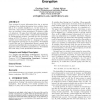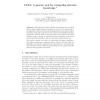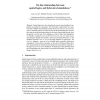227 search results - page 24 / 46 » A Spatial-Epistemic Logic for Reasoning about Security Proto... |
109
click to vote
JCS
2010
14 years 11 months ago
2010
Protocol authentication properties are generally trace-based, meaning that authentication holds for the protocol if authentication holds for individual traces (runs of the protoco...
115
click to vote
CCS
2006
ACM
15 years 5 months ago
2006
ACM
Type systems for secure information flow aim to prevent a program from leaking information from variables classified as H to variables classified as L. In this work we extend such...
103
click to vote
RTA
2009
Springer
15 years 7 months ago
2009
Springer
Reasoning about the knowledge of an attacker is a necessary step in many formal analyses of security protocols. In the framework of the applied pi calculus, as in similar languages...
FOSSACS
2010
Springer
15 years 7 months ago
2010
Springer
Abstract. Spatial logics have been introduced to reason about distributed computation in models for concurrency. We first define a spatial logic for a general class of infinite-...
119
click to vote
COOPIS
2002
IEEE
15 years 6 months ago
2002
IEEE
This paper makes two main contributions towards establishing support for application-specific factors in middleware security mechanisms. First, it develops a simple classification...



